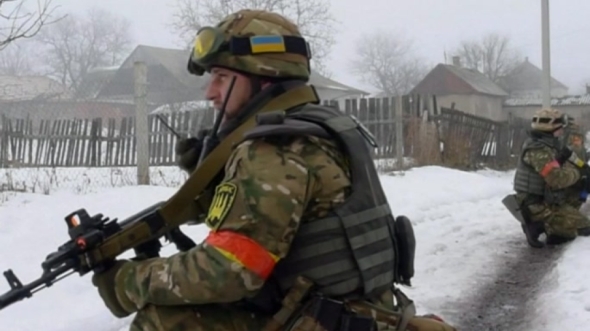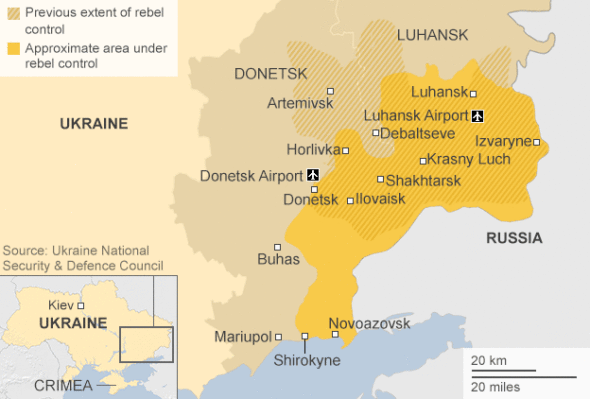redo Jump to...
print Print...

Ukrainian government forces sweep an empty village they believe is being used by rebels to transfer supplies. (Reuters)
(by Laetitia Peron, Agence France-Presse) Debaltseve, Ukraine — Battles have raged between Ukrainian government forces and pro-Russian Ukrainian rebels for control of a strategic transport hub as the death toll mounted in east Ukraine following the collapse of ceasefire talks.
Intense artillery fire thundered late Sunday around the government-controlled town of Debaltseve, a key position between the rebel-controlled cities of Donetsk and Lugansk, where insurgent fighters are trying to encircle Ukrainian troops. …

Officials said civilians were being evacuated along the only passable road linking the town to the government side and that conditions were increasingly dire for those left behind.
“People are fleeing because the shelling is non-stop. There’s no water, electricity or heating in the town,” local police commander Yevgen Lukhaniv told AFP.
Ukrainian military spokesman Volodymyr Polyovyi in Kiev said “constant battles” were going on around Debaltseve but pledged that government forces would not give up control of the last remaining road into the town.
The surge in fighting comes as Washington and NATO’s military commander appear to be moving towards supplying arms to Ukrainian forces, The New York Times reported Sunday.
President Barack Obama’s administration was reviewing whether to provide “lethal assistance,” in addition to non-lethal aid such as body armor and medical equipment which the U.S. already supplies to Kiev, it said.
“A comprehensive approach is warranted, and we agree that defensive equipment and weapons should be part of that discussion,” a Pentagon official told the Times.
[Western governments and Ukraine have accused Russia of sending regular troops and arms to bolster the rebels and spearhead the latest offensive — claims Moscow has repeatedly denied. The rebels claim to rely solely on military equipment poached from the Ukrainian army. But the separatist forces have deployed vast quantities of powerful weapons, much of which military experts say are not even in Ukraine’s arsenal.Ukraine’s military said Sunday 13 soldiers had died and 20 were wounded over the past 24 hours, pushing the military death toll over the past two days to 28.
At least 17 civilians also died in fighting across the war-torn east, government officials and separatist rebels said.
The latest bloodshed came as Ukraine’s warring sides looked further than ever from agreeing a peace deal after the collapse of truce talks Saturday.
French President Francois Hollande, German Chancellor Angela Merkel and Ukrainian President Petro Poroshenko, speaking by phone on Sunday, expressed their regret for “the failure of the talks” in the Belarussian capital Minsk.
The three leaders again called for “an immediate ceasefire,” according to the French presidency.
Mediators and Ukrainian representatives accused the rebels of [intentionally thwarting] Saturday’s truce talks despite growing international pressure to end a surge in violence in recent days.
The Organization for Security and Cooperation in Europe (OSCE), which is involved in the talks along with Russia, said that rebel negotiators in Minsk “were not even prepared to discuss implementation of a ceasefire and withdrawal of heavy weapons”.
Instead the insurgent representatives called for a total revision of an earlier Kremlin-backed peace plan signed in September that has formed the basis for all negotiations, the OSCE said in a statement.
The rebels say they now want to redraw the demarcation line between the two sides to include gains they have made since ripping up a shaky truce and pushing into Ukrainian territory.
The insurgents on Sunday slammed the OSCE for pinning the blame on them and said Kiev needs to halt fire before they will agree to a truce.
Kiev has rebuffed the new rebel demands and says their position has thrown any future peace talks into doubt.
“Unfortunately the peace process is now under threat,” Valeriy Chaly, the deputy head of Ukraine’s presidential administration wrote on his Facebook page.
Moscow — suffering the economic impact of harsh Western sanctions over the conflict — reacted cautiously to the collapse of the talks, saying that it “needed time to evaluate them.”
The 28-nation European Union on Thursday extended through September a first wave of targeted sanctions it had slapped on Moscow and Crimean leaders in the wake of Russia’s March seizure of the Black Sea peninsula from Ukraine.
But deep divisions within the EU meant that there was no agreement on expanding broad sanctions targeting Russia’s economy.
US Secretary of State John Kerry is set to jet into Kiev on Thursday to pledge Washington’s support during talks with President Poroshenko and Prime Minister Arseniy Yatsenyuk.
Reprinted here for educational purposes only. May not be reproduced on other websites without permission from Agence France-Presse. Visit the website at Agence France-Presse .com.
Questions
1. Name the following:
a) President of Russia
b) President of Ukraine
c) Prime Minister of Ukraine
d) President of France
e) Chancellor of Germany
f) U.S. Secretary of State
2. Why do pro-Russian Ukrainian rebels want to take control of the Ukrainian city of Debaltseve?
3. Why are the residents of Debaltseve leaving the city?
4. What help is the U.S. currently giving the Ukrainian government?
5. What other type of aid is the U.S. considering giving to the Ukrainian government?
6. a) How has Moscow responded to accusations that Russia has sent regular troops and arms to to help the pro-Russian rebels?
b) What evidence is there that disproves Russia’s denial?
7. NATO says that Russia is putting its military expertise and supplies behind the rebels. Rebel leader Alexander Zakharchenko announced plans to recruit 100,000 men. Zakharchenko, president of the self-declared Donetsk People’s Republic, hopes to create three motorized brigades to counterattack the Ukrainian government. Why might EU sanctions against Russia and Crimea’s leaders be ineffective?
8. a) Do you think the U.S. should give military equipment to Ukraine? Explain your answer.
b) Ask a parent the same question.
Background
- Ukraine gained independence after the collapse of the Soviet Union in 1991 and has since veered between seeking closer integration with Western Europe and reconciliation with Russia, which supplies most of the country’s energy.
- Europe’s second largest country, Ukraine is a land of wide, fertile agricultural plains, with large pockets of heavy industry in the east.
- While Ukraine and Russia share common historical origins, the west of the country has closer ties with its European neighbors, particularly Poland, and Ukrainian nationalist sentiment is strongest there.
- A significant minority of the population of Ukraine use Russian as their first language, particularly in the industrialized east. In Crimea, an autonomous republic on the Black Sea that was part of Russia until 1954, ethnic Russians make up about 60% of the population.
- Russia once again seized and annexed Crimea in March 2014, amid the chaos following the fall of pro-Russian Ukrainian President Viktor Yanukovych, plunging Europe into its worst diplomatic crisis since the Cold War. (from BBC News)
Daily “Answers” emails are provided for Daily News Articles, Tuesday’s World Events and Friday’s News Quiz.



